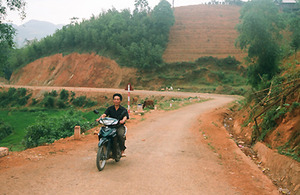Rural roads boost ethnic minority livelihoods in Vietnam
How UKaid funded road building in Vietnam helps ethnic minority families lift themselves out of poverty

Thich drives along the new road in Hoa Binh province, Vietnam
Thich and Som Bui and their 4 children live in the mountainous area of the Bac Son commune, in Vietnam’s Hoa Binh province. They belong to the Muong ethnic minority and farming is their sole livelihood.
A journey to the local market used to take Thich as long as 2 days in bad weather. But, thanks to a road building programme supported by UKaid from the Department for International Development (DFID), Thich’s journey to the local market is now much quicker.
This means that it’s easier for Thich to trade his produce and gradually he and family are lifting themselves out of poverty.
Tough travelling
Before the new roads existed, Thich had to walk 25 kilometres in mountainous terrain to get to the local markets. Life was tough and trading produce was a slow process.
“I rarely went anywhere, unless it was necessary,” recalls Thich.
“Perhaps my only trip in a week was to go to the market to exchange maize and cassava for salt and cooking oil, which is critical for our daily life.”
Connecting to the outside world
As well as opening up the markets, the DFID funded road building programme aims to reduce travel costs for the local communities and improve access to social services like health and education.
Around 400 ethnic minority households in Bac Son are benefiting from the road and 70% of them now own a motorbike.
Thich and Som have noticed a huge difference to their income and way of life since the new road opened.
Now they can get to the markets by bike or motorbike which makes trading produce faster. And the new transport links have also made it easier for dealers to go directly to Thich and Som’s house to buy farming products.
Recently, as passers-by increased, Thich and Som opened a small grocery to improve the family income.
“We now can earn around 1.5 million VND (around £50) a month altogether,” says Som.
“And my kids can go to school by bicycle. It’s made a big difference.”
Facts and stats
The Rural Transportation programme was co-funded by DFID and the World Bank.
DFID supported the programme with £54 million of UKaid.
Phase 2 of the programme, which took place between 2001 and 2006, helped to increase the number of communes with all weather roads by 28%. This helped to lift 210,000 people out of poverty over the project period.
Phase 2 covered 40 provinces. Phase three, which is taking place from 2007 to 2011, will cover 33 provinces.
Phase 3 includes maintenance and builds on proven elements of phase two.